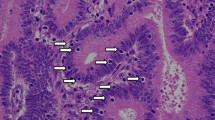Abstract
Background
The incidence of mismatch repair deficiency in colorectal cancer (CRC) in young people remains unknown in Asians. The present study assessed the clinicopathological features and efficacy of immunohistochemistry screening for Lynch syndrome in young Asian CRC patients.
Material and methods
This was a retrospective review conducted in Singapore General Hospital between January 2006 and December 2010 of 240 unrelated patients under the age of 50. All patients had immunohistochemical (IHC) staining for mismatch repair proteins in resected CRC specimen data retrieved from a prospective computerized database.
Results
A total of 21 % (n = 51) of the patients had abnormal IHC staining. Loss of staining for MLH1, MSH2, MSH6, and PMS2 proteins was observed in 10, 4, 6, and 13 % of tumors, respectively. Of the 22 patients who had abnormal staining of MLH1, 13 had concomitant abnormal staining for PMS2. One tumor specimen had abnormal staining in all four proteins. If the Amsterdam criteria alone were to be used, 86 % (n = 44) of the cohort would have not been detected for mismatch repair gene defects.
Conclusions
The overall burden of germline mismatch repair deficiency in the Singapore population may be as high as 21 %. The Amsterdam criteria alone are inadequate to detect Lynch syndrome patients. The use of IHC staining of at least four mismatch repair proteins is a useful screening strategy for Lynch syndrome diagnosis. Routine screening of mismatch repair deficiency may be recommended for all young Asian CRC patients.






Similar content being viewed by others
References
Lamberti C, Mangold E, Pagenstecher C et al (2006) Frequency of hereditary non-polyposis colorectal cancer among unselected patients with colorectal cancer in Germany. Digestion 74:58–67
Pinol V, Castells A, Andreu M, The Gastrointestinal Oncology Group of the Spanish Gastroenterological Association et al (2005) Accuracy of revised Bethesda guidelines, microsatellite instability, and immunohistochemistry for the identification of patients with hereditary nonpolyposis colorectal cancer. JAMA 293:1986–1994
Aaltonen LA, Salovaara R, Kristo P et al (1998) Incidence of hereditary nonpolyposis colorectal cancer and the feasibility of molecular screening for the disease. N Engl J Med 338:1481–1487
Watson P, Riley B (2005) The tumor spectrum in the Lynch syndrome. Fam Cancer 4:245–248
Woods MO, Hyde AJ, Curtis FK et al (2005) High frequency of hereditary colorectal cancer in Newfoundland likely involves novel susceptibility genes. Clin Cancer Res 11:6853–6861
Aaltonen LA, Peltomaki P, Mecklin JP et al (1994) Replication errors in benign and malignant tumors from hereditary nonpolyposis colorectal cancer patients. Cancer Res 54:1645–1648
Palomaki GE, McClain MR, Melillo S et al (2009) EGAPP supplementary evidence review: DNA testing strategies aimed at reducing morbidity and mortality from Lynch syndrome. Genet Med 11:42–65
Boland CR, Koi M, Chang DK et al (2008) The biochemical basis of microsatellite instability and abnormal immunohistochemistry and clinical behavior in Lynch syndrome: from bench to bedside. Fam Cancer 7:1–52
Fishel R, Lescoe MK, Rao MR et al (1994) The human mutator gene homolog MSH2 and its association with hereditary nonpolyposis colon cancer. Cell 77:167
Wang XL, Yuan Y, Zhang SZ et al (2006) Clinical and genetic characteristics of Chinese hereditary nonpolyposis colorectal cancer families. World J Gastroenterol 12:4074–4077
Chew MH, Koh PK, Ng KH et al (2008) Phenotypic characteristics of hereditary non-polyposis colorectal cancer by the Amsterdam criteria: an Asian perspective. ANZ J Surg 78:556–560
Goh HS, Wong J (1992) The Singapore Polyposis Registry. Ann Acad Med Singapore 21:290–293
Edge SB, Byrd DR, Compton CC et al (2009) AJCC Cancer Staging Manual, 7th edn. Springer, New York
Vasen HF, Watson P, Mecklin JP et al (1999) New clinical criteria for hereditary nonpolyposis colorectal cancer (HNPCC, Lynch syndrome) proposed by the International Collaborative group on HNPCC. Gastroenterology 116:1453–1456
Vasen HF, Mecklin JP, Khan PM et al (1994) The International Collaborative Group on Hereditary Non-Polyposis Colorectal Cancer (ICG-HNPCC). Anticancer Res 14:1661–1664
Rodriguez-Bigas MA, Boland CR, Hamilton SR et al (1997) A National Cancer Institute Workshop on Hereditary Nonpolyposis Colorectal Cancer Syndrome: meeting highlights and Bethesda guidelines. J Natl Cancer Inst 89:1758–1762
Kievit W, de Bruin JH, Adang EM et al (2004) Current clinical selection strategies for identification of hereditary non-polyposis colorectal cancer families are inadequate: a meta-analysis. Clin Genet 65:308–316
Chappelle A, Hampel H (2010) Clinical relevance of microsatellite instability in colorectal cancer. J Clin Oncol 28:3380–3387
Chaves P, Cruz C, Lage P et al (2000) Immunohistochemical detection of mismatch repair gene proteins as a useful tool for the identification of colorectal carcinoma with the mutator phenotype. J Pathol 191:355–360
Cawkwell L, Gray S, Murgatroyd H et al (1999) Choice of management strategy for colorectal cancer based on a diagnostic immunohistochemical test for defective mismatch repair. Gut 45:409–415
Yap HL, Chieng WS, Lim JR et al (2008) Recurring MLH1 deleterious mutations in unrelated Chinese Lynch syndrome families in Singapore. Fam Cancer 8:85–94
Author information
Authors and Affiliations
Corresponding author
Rights and permissions
About this article
Cite this article
Chew, MH., Koh, PK., Tan, M. et al. Mismatch Repair Deficiency Screening via Immunohistochemical Staining in Young Asians with Colorectal Cancers. World J Surg 37, 2468–2475 (2013). https://doi.org/10.1007/s00268-013-2134-2
Published:
Issue Date:
DOI: https://doi.org/10.1007/s00268-013-2134-2




